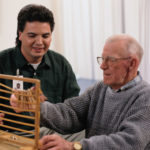
Occupational therapists help people of all ages to fully engage in their daily lives, from their work and recreation to activities of daily living like getting dressed, cooking, eating and driving.
If you choose this field, there are many kinds of practice available for you to specialize in. You may decide to work with premature babies at a pediatric hospital or children with cerebral palsy or Down syndrome. Many practitioners choose to help children thrive in the “occupations” of childhood, which include learning, playing and growing.
Therapists also work in schools with students who have learning disabilities or behavioral problems. Or you may be interested in working with older people in their homes or nursing homes, helping them to recover from strokes or deal with Alzheimer’s disease. Some practitioners choose to help accident victims to regain needed skills or offer assistance to people with mental illness.
There are new specialties too, like training workers to use the correct ergonomics, helping people with low vision maintain their independence, making buildings and homes more accessible, evaluating and training older drivers and promoting health and wellness.
- An individualized evaluation, during which the client/family and occupational therapist determine the person’s goals
- Customized intervention to improve the person’s ability to perform daily activities and reach the goals
- An outcomes evaluation to ensure that the goals are being met and/or make changes to the intervention plan
Occupational therapy services may include comprehensive evaluations of the client’s home and other environments (e.g., workplace, school), recommendations for adaptive equipment and training in its use, and guidance and education for family members and caregivers. Occupational therapy practitioners have a holistic perspective, in which the focus is on adapting the environment to fit the person, and the person is an integral part of the therapy team.
Working Conditions
Most occupational therapists work in hospitals or occupational therapy practices while others work in schools, physicians’ offices, home health services and nursing homes. Occupational therapists in hospitals and other health care and community settings usually work a 40-hour week. They spend a great many of those hours on their feet while working with patients.
Occupational therapists who work in schools may need to stay after school for meetings or other activities.
More than 30% of all occupational therapists work part-time.
Salary Range and Outlook
Occupational therapists represent a much-needed career and the employment outlook is bright. Between 2012 and 2022, employment of occupational therapists is projected to grow 29%, much faster than the average for all occupations.
Academic Requirements
To become an occupational therapist, you will first need to get a bachelor’s degree and then go on to a master’s degree program in occupational therapy. As an undergraduate, you can major in anything that interests you so long as you make sure to take the necessary prerequisites for the occupational therapy programs you apply to. Most will require courses in biology and physiology, and some programs will also expect you to have volunteered or worked in an occupational therapy setting.
Master’s programs generally take two to three years to complete. You may decide to apply to a program that offers a bachelor’s and master’s degree in a total of five years.
Some students go on to get a doctorate in occupational therapy. Doctoral programs usually require three years of study.
Both master’s and doctoral programs require at least 24 weeks of supervised fieldwork, in which prospective occupational therapists gain clinical work experience.
You can find accredited programs through the American Occupational Therapy Association.
Licensure and Specialization
Most states require occupational therapists to pass the national examination administered by the National Board for Certification in Occupational Therapy. To take the exam, you must have earned a degree from an accredited educational program and completed all fieldwork requirements. Once you pass the exam, you will need to take continuing education classes to maintain your certification.
The American Occupational Therapy Association also offers a number of certifications for therapists who want to demonstrate their advanced level of knowledge in a specialty area, such as pediatrics, gerontology, driving and community mobility or low vision.
Learn More About a Career as an Occupational Therapist
- Meet an occupational therapist and hear about her job.
- Watch a video about occupational therapists (in the Health Science category).
